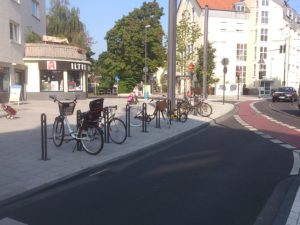The research project focuses on empirical research into the effects of municipal online participation procedures and the identification of relevant influencing factors. For this purpose, online participation processes on the topic of “Improvement options in bicycle traffic” were carried out in September and October 2017 as part of a comparative case study in the cities of Bonn and Moers as well as in the Cologne district of Ehrenfeld.
These procedures serve the respective municipalities, among other things, as a basis for the further planning of measures for the bicycle infrastructure. In cooperation with the service provider Zebralog, the participating municipalities were provided with an online platform for locating, commenting on and coordinating problem areas in the municipality that are relevant to cycling. Details on the individual processes can be found here:
The effects of these participation processes, particularly with regard to the quality and legitimacy of the results produced, were empirically investigated using quantitative and qualitative methods. Among other things, surveys of participants and population-representative surveys in the municipalities concerned were used.
The essential extension of existing studies consisted in the comparative research design with a largely standardized participation instrument, which should make it possible to determine the effects of such participation processes in a scientifically valid way on an empirical basis. This is done primarily by comparing people who participated in the online process with those who did not, and by comparing them over time (before/after).
Overall, this makes an important contribution to a theory of online political participation. The relevance of the project is not limited to science, however, but also extends to the targeted design of participation procedures in practice.
The pilot project was financed for a total of 24 months by the Strategic Research Fund of Heinrich Heine University Düsseldorf and with further support from the Düsseldorf Institute for Internet and Democracy (DIID).
Results from the project have been presented at various conferences so far, and further publications are in the works
- Rottinghaus, Bastian. and Escher, Tobias 2020. “Mechanisms for inclusion and exclusion through digital political participation: Evidence from a comparative study of online consultations in three German cities.” Zeitschrift für Politikwissenschaft.
- Escher, Tobias; Rottinghaus, Bastian (2019): „The impact of ICTs on public support for democracy: Evidence from a comparative case study of online consultations in three German municipalities”. Governance of Big Transformations (Jahrestagung der DVPW-Sektion Vergleichende Politikwissenschaft). TU München, 21. bis 23. März 2019.
- Escher, Tobias; Rottinghaus, Bastian (2019): „Inklusion oder Exklusion durch digitale Partizipation? – Evidenzen aus einer vergleichenden Fallstudie in drei deutschen Städten”. Die digitalisierte Demokratie – Politik und Kommunikation zwischen Daten, Netzwerken und Algorithmen (gemeinsame Jahrestagung des DVPW Arbeitskreises Politik und Kommunikation sowie der DGPuK Fachgruppe Kommunikation und Politik). Universität Duisburg-Essen, 7. bis 9. Februar 2019.
- Escher, Tobias; Rottinghaus, Bastian (2018): “Local government platforms for citizen participation and their effects on legitimacy: evidence from a comparative case study in Germany”. The Internet, Policy & Politics Conference 2018 (Oxford, September 2018)
- Rottinghaus, Bastian; Escher, Tobias (2018): „Online Citizen Participation and its Effects on Legitimacy: Evidence from a Comparative Case Study in three German Municipalities“. 2018 ECPR General Conference (Hamburg, August 2018)
- Escher, Tobias; Rottinghaus, Bastian (2018): Effects of Online Participation on Legitimacy Beliefs of the Public: Evidence from a Comparative Case Study in three German Municipalities. IPSA World Congress of Political Science (Brisbane, Juli 2018)
- Rottinghaus, Bastian; Escher, Tobias (2017): “Measuring online political participation and its consequences for local governments and their citizens”. 2017 ECPR General Conference (Oslo, September 2018)
Data collected during the project have also been used in various student theses:
- Marco Wähner (MA Social Sciences 2018): “Internet-specific resources as a predictor of political (online) participation”
- Philipp Grawe (MA Computer Science 2018): “Analysis of online participation processes: Topic extraction, visualization and interaction”
- Markus Brenneis (MA Computer Science 2018): “Analysis of online participation processes: Automated tagging of text contributions”
Contact
Jun.-Prof. Dr. Tobias Escher
Board, Computer Science, Political Science, Sociology

Tobias Escher leads a BMBF-funded junior research group investigating the effects of participation processes on the quality and legitimacy of political decisions, especially in the context of the transformation to sustainable mobility in the local context. Previously, he supervised the DIID as well as the NRW Forschungskolleg Online-Partizipation at the HHU-Düsseldorf as scientific coordinator. He is a social scientist and holds a PhD from the Oxford Internet Institute at the University of Oxford. He can also draw on his basic knowledge of computer science when assessing the possibilities and limits of digitization.
His research focuses on the evaluation of political participation online and offline. In particular, he addresses the question of the extent to which citizen participation contributes to higher quality and legitimacy/acceptance of political decisions. He has developed a teaching module on the theory and practice of online participation, from which, among other things, a project on student participation in teaching has emerged.
Photographer: ©Tilman Schenk
Projects
Contact
Dr. Bastian Rottinghaus
Alumni, Sociology

Bastian Rottinghaus worked as a research assistant at DIID between October 2016 and December 2019. Previously, he studied Social Sciences (B.A. and M.A.) at the HHU-Düsseldorf. From 2010 on, he was initially employed as a research assistant at the Chair of Sociology II at HHU-Düsseldorf. His dissertation, submitted in 2015, focused on the empirical measurement of aspects of political competence and their effects on political participatory action. His work at DIID focused on collaborating on a comprehensive research project on the effects and influencing factors of municipal online participation in a comparative perspective and, in a follow-up project, on the continuation of the DIID Monitor.
In his current position at the DJI in Halle, he is involved as a researcher in the evaluation of the federal program “Demokratie leben!





